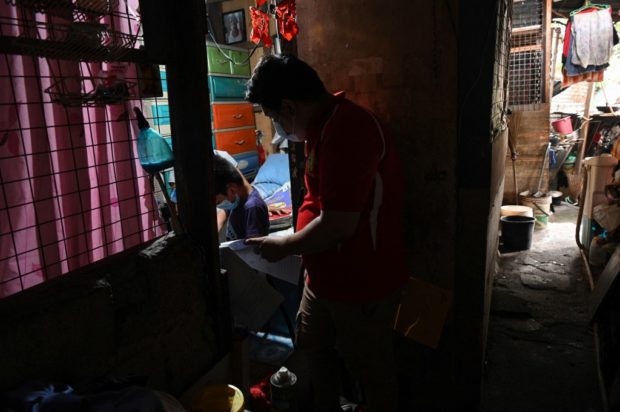Unicef worries over new stay-at-home policy for minors in Metro Manila

In this photo taken on February 11, 2021, student Andrix Serrano (C) reviews lessons with his teacher Kristhean Navales (R) at a home in an informal settlers area in Quezon City, suburban Manila. – A year after the coronavirus pandemic sent the Philippines into a months-long lockdown, classrooms across the country remain empty and children are still stuck at home. (Photo by Ted ALJIBE / AFP FILE)
MANILA, Philippines — The United Nations International Children’s Emergency Fund (Unicef) has expressed concern over the government’s decision to bar minors from going out in Metro Manila, asserting that such a policy might infringe on the rights of children.
Unicef said Friday that while they understand Metro Manila mayors for coming up with that rule, it also noted that lockdowns have negative effects on children’s well-being.
Metro Manila mayors were compelled to impose lockdowns and restrict movements of minors outside of their houses because the nation’s capital region saw a rapid surge of new COVID-19 cases. The Philippines has been on lockdown since March 2020 – dubbed as the world’s longest – but has been seeing its infections quickly and continuously rising since the start of 2021.
As of March 19, the country hit its unprecedented single-day record of new COVID-19 infections with 7,103, driving nationwide active cases to 73,264.
“Unicef acknowledges the efforts put in place by the Government of the Philippines to control the recent surge in COVID-19 infections. However, the recent decision […] to explicitly prohibit minors from going outside for a period of two weeks, in a bid to contain the transmission of the virus in the metropolis, can be considered an infringement of children’s rights,” Unicef said.
Article continues after this advertisement“As the pandemic enters its second year, the impact on children and young people’s psycho-social wellbeing and mental health risks is taking a toll. Due to the restrictive containment measures adopted since the onset of the pandemic, children have lived away from members of their extended families, teachers, and friends,” it added.
Article continues after this advertisementOn March 16, the Metropolitan Manila Development Authority (MMDA) said all 17 mayors in the National Capital Region (NCR) have agreed to ban minors from leaving their homes in the wake of increasing COVID-19 cases.
The reimposition of the stay-at-home policy for minors was among several measures adopted by MMDA and the national government to curb the new surge, which health experts believe is caused by a number of COVID-19 variants spreading in NCR.
Aside from the ban on minors, uniform curfew was also placed in Metro Manila as inbound travel to the Philippines was disallowed, except for returning overseas Filipino workers.
Unicef appealed for the government to assess if measures it imposed to combat COVID-19 transmission are really effective in curbing new cases and if those would not do more harm than good to the people.
“While efforts to contain the spread of infections require public health and social measures, UNICEF emphasizes that these measures should consider the highest level of acceptability and feasibility, proven effectiveness and should minimize the negative consequences on health and well-being of all members of society,” it said.
“They should respond to the best interest of the child; should not cause further harm; and should always consider the preservation of the child’s wellbeing and dignity,” it added. “They have been learning from home, often confronting incredibly challenging circumstances. For those experiencing violence, neglect or abuse at home, lockdowns left them stranded with abusers and without the required support.”
Unicef urged the Philippine government to find better means of managing the rising COVID-19 cases – policies that would have minimal impact on the country’s citizens, especially on children.
“As the pandemic continues to affect communities, we must find better ways to manage it together. Children and their communities should be consulted and an evidence-based rationale for measures that affect them, should be developed and communicated transparently,” it explained.
“We need to take into full account the needs and rights of children, while we continue to protect them and all members of the public, from the increased risk of COVID-19 infections,” it added.
KGA
For more news about the novel coronavirus click here.
What you need to know about Coronavirus.
For more information on COVID-19, call the DOH Hotline: (02) 86517800 local 1149/1150.
The Inquirer Foundation supports our healthcare frontliners and is still accepting cash donations to be deposited at Banco de Oro (BDO) current account #007960018860 or donate through PayMaya using this link.